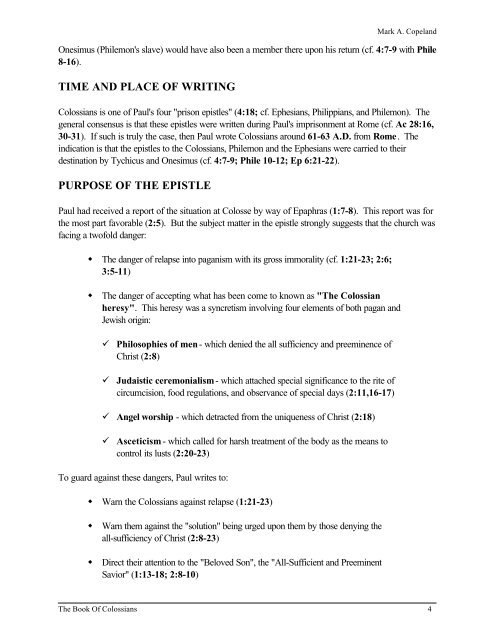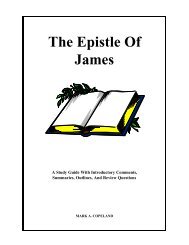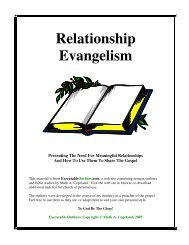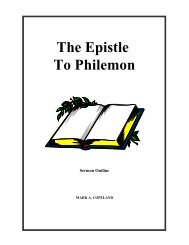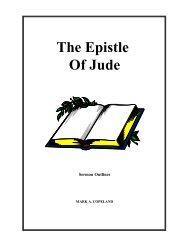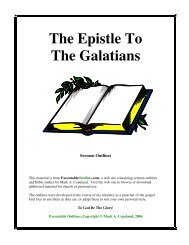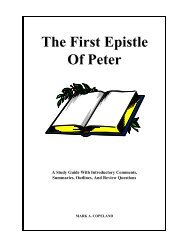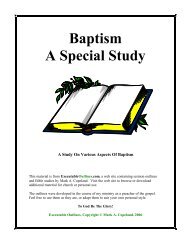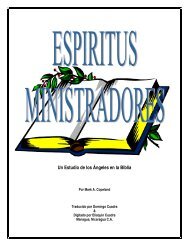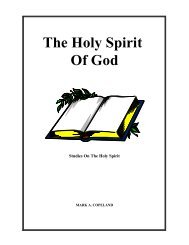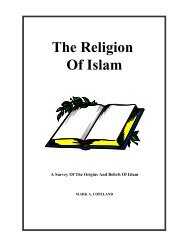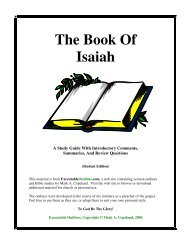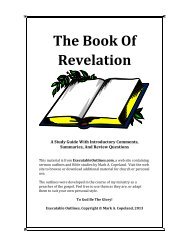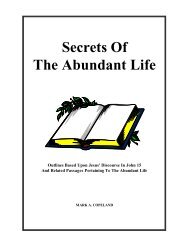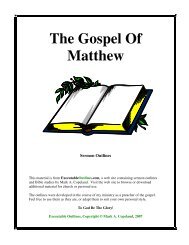The Epistle To The Colossians - Executable Outlines
The Epistle To The Colossians - Executable Outlines
The Epistle To The Colossians - Executable Outlines
You also want an ePaper? Increase the reach of your titles
YUMPU automatically turns print PDFs into web optimized ePapers that Google loves.
Onesimus (Philemon's slave) would have also been a member there upon his return (cf. 4:7-9 with Phile<br />
8-16).<br />
TIME AND PLACE OF WRITING<br />
<strong>Colossians</strong> is one of Paul's four "prison epistles" (4:18; cf. Ephesians, Philippians, and Philemon). <strong>The</strong><br />
general consensus is that these epistles were written during Paul's imprisonment at Rome (cf. Ac 28:16,<br />
30-31). If such is truly the case, then Paul wrote <strong>Colossians</strong> around 61-63 A.D. from Rome. <strong>The</strong><br />
indication is that the epistles to the <strong>Colossians</strong>, Philemon and the Ephesians were carried to their<br />
destination by Tychicus and Onesimus (cf. 4:7-9; Phile 10-12; Ep 6:21-22).<br />
PURPOSE OF THE EPISTLE<br />
Paul had received a report of the situation at Colosse by way of Epaphras (1:7-8). This report was for<br />
the most part favorable (2:5). But the subject matter in the epistle strongly suggests that the church was<br />
facing a twofold danger:<br />
<strong>The</strong> danger of relapse into paganism with its gross immorality (cf. 1:21-23; 2:6;<br />
3:5-11)<br />
<strong>The</strong> danger of accepting what has been come to known as "<strong>The</strong> Colossian<br />
heresy". This heresy was a syncretism involving four elements of both pagan and<br />
Jewish origin:<br />
Philosophies of men - which denied the all sufficiency and preeminence of<br />
Christ (2:8)<br />
Judaistic ceremonialism - which attached special significance to the rite of<br />
circumcision, food regulations, and observance of special days (2:11,16-17)<br />
Angel worship - which detracted from the uniqueness of Christ (2:18)<br />
Asceticism - which called for harsh treatment of the body as the means to<br />
control its lusts (2:20-23)<br />
<strong>To</strong> guard against these dangers, Paul writes to:<br />
Warn the <strong>Colossians</strong> against relapse (1:21-23)<br />
Warn them against the "solution" being urged upon them by those denying the<br />
all-sufficiency of Christ (2:8-23)<br />
Direct their attention to the "Beloved Son", the "All-Sufficient and Preeminent<br />
Savior" (1:13-18; 2:8-10)<br />
Mark A. Copeland<br />
<strong>The</strong> Book Of <strong>Colossians</strong> 4


